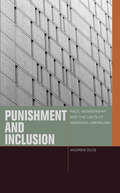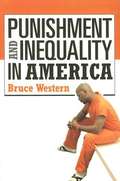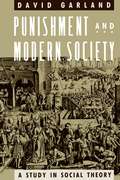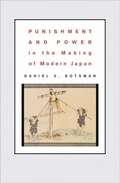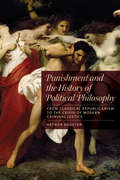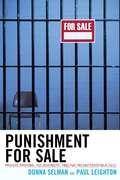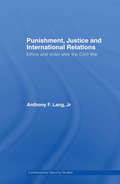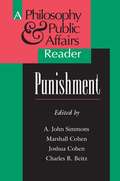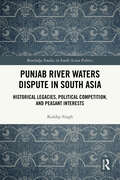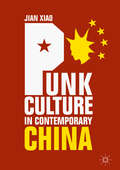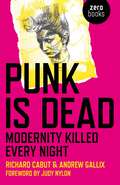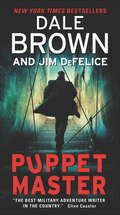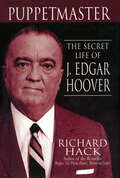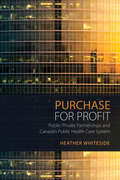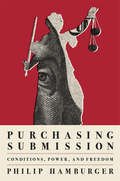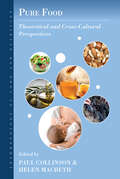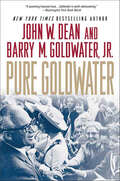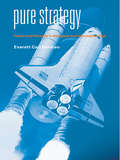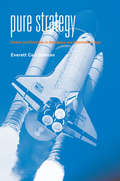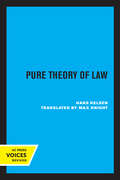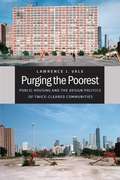- Table View
- List View
Punishment and Inclusion: Race, Membership, and the Limits of American Liberalism (Just Ideas)
by Andrew DiltsAt the start of the twenty-first century, 1 percent of the U.S. population is behind bars. An additional 3 percent is on parole or probation. In all but two states, incarcerated felons cannot vote, and in three states felon disenfranchisement is for life. More than 5 million adult Americans cannot vote because of a felony-class criminal conviction, meaning that more than 2 percent of otherwise eligible voters are stripped of their political rights. Nationally, fully a third of the disenfranchised are African American, effectively disenfranchising 8 percent of all African Americans in the United States. In Alabama, Kentucky, and Florida, one in every five adult African Americans cannot vote.Punishment and Inclusion gives a theoretical and historical account of this pernicious practice of felon disenfranchisement, drawing widely on early modern political philosophy, continental and postcolonial political thought, critical race theory, feminist philosophy, disability theory, critical legal studies, and archival research into state constitutional conventions. It demonstrates that the history of felon disenfranchisement, rooted in postslavery restrictions on suffrage and the contemporaneous emergence of the modern “American” penal system, reveals the deep connections between two political institutions often thought to be separate, showing the work of membership done by the criminal punishment system and the work of punishment done by the electoral franchise.Felon disenfranchisement is a symptom of the tension that persists in democratic politics between membership and punishment. This book shows how this tension is managed via the persistence of white supremacy in contemporary regimes of punishment and governance.
Punishment and Inequality in America
by Bruce WesternOver the last thirty years, the prison population in the United States has increased more than seven-fold to over two million people, including vastly disproportionate numbers of minorities and people with little education. For some racial and educational groups, incarceration has become a depressingly regular experience, and prison culture and influence pervade their communities. Almost 60 percent of black male high school drop-outs in their early thirties have spent time in prison. In Punishment and Inequality in America, sociologist Bruce Western explores the recent era of mass incarceration and the serious social and economic consequences it has wrought. Punishment and Inequality in America dispels many of the myths about the relationships among crime, imprisonment, and inequality. While many people support the increase in incarceration because of recent reductions in crime, Western shows that the decrease in crime rates in the 1990s was mostly fueled by growth in city police forces and the pacification of the drug trade. Getting "tough on crime" with longer sentences only explains about 10 percent of the fall in crime, but has come at a significant cost. Punishment and Inequality in America reveals a strong relationship between incarceration and severely dampened economic prospects for former inmates. Western finds that because of their involvement in the penal system, young black men hardly benefited from the economic boom of the 1990s. Those who spent time in prison had much lower wages and employment rates than did similar men without criminal records. The losses from mass incarceration spread to the social sphere as well, leaving one out of ten young black children with a father behind bars by the end of the 1990s, thereby helping perpetuate the damaging cycle of broken families, poverty, and crime. The recent explosion of imprisonment is exacting heavy costs on American society and exacerbating inequality. Whereas college or the military were once the formative institutions in young men's lives, prison has increasingly usurped that role in many communities. Punishment and Inequality in America profiles how the growth in incarceration came about and the toll it is taking on the social and economic fabric of many American communities.
Punishment and Modern Society: A Study in Social Theory (Studies In Crime And Justice Ser.)
by David GarlandIn this path-breaking book, David Garland argues that punishment is a complex social institution that affects both social relations and cultural meanings. Drawing on theorists from Durkheim to Foucault, he insightfully critiques the entire spectrum of social thought concerning punishment, and reworks it into a new interpretive synthesis. "Punishment and Modern Society is an outstanding delineation of the sociology of punishment. At last the process that is surely the heart and soul of criminology, and perhaps of sociology as well—punishment—has been rescued from the fringes of these 'disciplines'. . . . This book is a first-class piece of scholarship."—Graeme Newman, Contemporary Sociology "Garland's treatment of the theorists he draws upon is erudite, faithful and constructive. . . . Punishment and Modern Society is a magnificent example of working social theory."—John R. Sutton, American Journal of Sociology "Punishment and Modern Society lifts contemporary penal issues from the mundane and narrow contours within which they are so often discussed and relocates them at the forefront of public policy. . . . This book will become a landmark study."—Andrew Rutherford, Legal Studies "This is a superbly intelligent study. Its comprehensive coverage makes it a genuine review of the field. Its scholarship and incisiveness of judgment will make it a constant reference work for the initiated, and its concluding theoretical synthesis will make it a challenge and inspiration for those undertaking research and writing on the subject. As a state-of-the-art account it is unlikely to be bettered for many a year."—Rod Morgan, British Journal of Criminology Winner of both the Outstanding Scholarship Award of the Crime and Delinquency Division of the Society for the Study of Social Problems and the Distinguished Scholar Award from the American Sociological Association's Crime, Law, and Deviance Section
Punishment and Power in the Making of Modern Japan
by Daniel V. BotsmanThe kinds of punishment used in a society have long been considered an important criterion in judging whether a society is civilized or barbaric, advanced or backward, modern or pre-modern. Focusing on Japan, and the dramatic revolution in punishments that occurred after the Meiji Restoration, the author asks how such distinctions have affected our understanding of the past and contributed, in turn, to the proliferation of new kinds of barbarity in the modern world. The book concludes by examining how modern ideas about progress and civilization shaped penal practices in Japan's own colonial empire.
Punishment and the History of Political Philosophy
by Arthur ShusterContemporary philosophy still lacks a satisfying theory of punishment, one that adequately addresses our basic moral concerns. Yet, as the crisis of incarceration in the United States and elsewhere shows, the need for a deeper understanding of punishment's purpose has never been greater.In Punishment and the History of Political Philosophy, Arthur Shuster offers an insightful study of punishment in the works of Plato, Hobbes, Montesquieu, Beccaria, Kant, and Foucault. Through careful interpretation of their key texts, he argues that continuing tensions over retribution's role in punishment reflect the shift in political philosophy from classical republicanism to modern notions of individual natural rights and the social contract.This book will be vital reading for political theorists, philosophers, criminologists, and legal scholars looking for a new perspective on the moral challenges faced by the modern criminal justice system.
Punishment for Sale: Private Prisons and Big Business, and the Incarceration Binge
by Donna Selman Paul LeightonPunishment for Sale is the definitive modern history of private prisons, told through social, economic and political frames. The authors explore the origin of the ideas of modern privatization, the establishment of private prisons, and the efforts to keep expanding in the face of problems and bad publicity. The book provides a balanced telling of the story of private prisons and the resistance they engendered within the context of criminology, and it is intended for supplemental use in undergraduate and graduate courses in criminology, social problems, and race and ethnicity.
Punishment, Justice and International Relations: Ethics and Order after the Cold War (Contemporary Security Studies)
by Anthony F. Lang Jr.This book examines the international political order in the post-Cold War era, arguing that this order has become progressively more punitive. This is seen as resulting from both a human-rights regime that emphasizes legal norms and the aggressive policies of the United States and its allies in the 'War on Terror'. While punishment can play a key role in creating justice in a political system, serious flaws in the current global order militate against punishment-enforcing global norms. The book argues for the necessary presence of three key concepts - justice, authority and agency - if punishment is to function effectively, and explores four practices in the current international system: intervention, sanctions, counter- terrorism policy, and war crimes tribunals. It concludes by suggesting ways to revise the current global political structure in order to enable punitive practices to play a more central role in creating a just world order. This book will be of much interest to students of International Law, Political Science and International Relations.
Punishment: A Philosophy and Public Affairs Reader (Philosophy and Public Affairs Readers #2)
by A. John SimmonsThe problem of justifying legal punishment has been at the heart of legal and social philosophy from the very earliest recorded philosophical texts. However, despite several hundred years of debate, philosophers have not reached agreement about how legal punishment can be morally justified. That is the central issue addressed by the contributors to this volume. All of the essays collected here have been published in the highly respected journal Philosophy & Public Affairs. Taken together, they offer not only significant proposals for improving established theories of punishment and compelling arguments against long-held positions, but also ori-ginal and important answers to the question, "How is punishment to be justified?" Part I of this collection, "Justifications of Punishment," examines how any practice of punishment can be morally justified. Contributors include Jeffrie G. Murphy, Alan H. Goldman, Warren Quinn, C. S. Nino, and Jean Hampton. The papers in Part II, "Problems of Punishment," address more specific issues arising in established theories. The authors are Martha C. Nussbaum, Michael Davis, and A. John Simmons. In the final section, "Capital Punishment," contributors discuss the justifiability of capital punishment, one of the most debated philosophical topics of this century. Essayists include David A. Conway, Jeffrey H. Reiman, Stephen Nathanson, and Ernest van den Haag.
Punjab River Waters Dispute in South Asia: Historical Legacies, Political Competition, and Peasant Interests (Routledge Studies in South Asian Politics)
by Kuldip SinghThis book examines the Punjab river waters controversy in South Asia, a major defining feature of Punjab politics. It also studies the difficult situation relating to the waters at the intersectionality of Punjab, the rural Sikh community, the neighboring state of Haryana, and the Indian central government. Analyzing the history of the dispute dating back to the partition of the country in 1947, the book looks at the constitutional provisions and other laws which govern the allocation of inter-state river waters in India and their application/ departure in the allocation of river waters in case of Punjab. It also assesses the impact of river waters issue on politics of the State. The author investigates how Punjab peasants, an influential segment of society, have played a catalytic role in determining party positions on the subject, resulting in a situation where the SutlejYamuna Link (SYL) canal will not be allowed to be constructed in Punjab territory. An important contribution to the waters dispute in the Punjab, this book will be of interest to academics studying South Asian and Indian politics and rural political economy.
Punk Culture in Contemporary China
by Jian XiaoThis book explores for the first time the punk phenomenon in contemporary China. As China has urbanised within the context of explosive economic growth and a closed political system, urban subcultures and phenomena of alienation and anomie have emerged, and yet, the political and economic differences between China and western societies has ensured that these subcultures operate and are motivated by profoundly different structures. This book will be of interest to cultural historians, media studies and urban studies researchers, and (ex-) punk rockers.
Punk Is Dead: Modernity Killed Every Night
by Andrew Gallix Richard CabutThis original collection of insight, analysis and conversation charts the course of punk from its underground origins, when it was an un-formed and utterly alluring near-secret, through its rapid development. Punk is Dead: Modernity Killed Every Night takes in sex, style, politics and philosophy, filtered through punk experience, while believing in the ruins of memory, to explore a past whose essence is always elusive.
Punto de Equilibrio
by J. G. JuradoEn esta brillante novela, en la que el suspenso nunca termina, un renombrado neurocirujano se ve forzado a decidir entre terminar la vida de la persona más importante de los Estados Unidos o garantizar la terrible muerte de su propia hija.No soy un santo, ni un mártir, tampoco un terrorista, un maníaco, ni asesino... Soy un padre. Esta es mi historia. El Dr. David Evans es un reconocido neurocirujano en un hospital en Washington, DC, y un padre devoto. Pero pronto tendrá que enfrentarse al peor de los dilemas: si su siguiente paciente, que necesita una cirugía en el cerebro, sale del quirófano vivo, su pequeña hija morirá en las manos del despiadado psicópata que la secuestró, y él tendrá que ser testigo. En el transcurso de las cincuenta y cinco horas frenéticas para llegar al momento de decisión en la sala de cirugía, el Dr. Evans tendrá que encontrar a su enemigo y hallar una salida para esta abominable pesadilla. Y, ¿qué tan lejos llegará para salvara a su hija? "Una montaña rusa de miedo y suspenso sin precedentes en la literatura moderna" (Katherine Neville, autora bestseller del New York Times), Punto de Equilibrio lo mantendrá al borde de su asiento con escenas de acción rápidas y emoción cruda mientras un hombre se enfrenta a un imposible dilema moral que puede cambiar el curso de la historia.
Puppet Master (Puppetmaster #1)
by Dale Brown Jim DeFeliceNew York Times–Bestselling Authors: A roboticist aids the FBI in fighting Eastern European criminals using AI—until things go very wrong . . . Louis Massina is revolutionizing the field of robotics. His technological wonders are capable of locating disaster survivors, preventing nuclear meltdowns, and replacing missing limbs. After one of Massina’s creations makes a miraculous rescue, an FBI agent recruits him to pursue Russian mobsters running a massive financial scam—and not coincidentally, suspected of killing the agent’s brother. Massina agrees to deploy a surveillance bot that uses artificial intelligence to follow its target. But when he’s thrust into a dangerous conspiracy, the billionaire inventor decides to take matters into his own hands—unleashing the greatest cyberweapons in the world and becoming the Puppet Master . . . .Acclaim for Dale Brown“Authentic [and] riveting.” —San Francisco Chronicle“Gripping.” —New York Times
Puppetmaster: The Secret Life of J. Edgar Hoover
by Richard HackBiography of the former FBI director, who led and influenced it for so many years.
Puppetmaster: The Secret Life of J. Edgar Hoover
by Richard HackJ. Edgar Hoover—the most powerful lawman in America for over fifty years—was also the country's most controversial and feared public servant. His career as director of the Federal Bureau of Investigation spanned nine different presidential administrations and survived a dozen attempts to sweep him from office. During that time, Hoover completely reshaped domestic law enforcement as he expanded the reach of the FBI and transformed his G-men into an elite national crime fighting division. Despite his contributions to the criminal justice system, Hoover fell from favor soon after his death, the victim of rampant rumors and innuendo. In Puppetmaster, Richard Hack separates truth from fiction to reveal the most hidden secrets of Hoover's private life and exposes previously undisclosed conduct that threatened to compromise the security of the entire nation. Based on files, documents, and over 100,000 pages of FBI memos and State Department papers, Hack rips the lid off Hoover's façade of propriety to detail a life replete with sexual indiscretions, criminal behavior, and a long-standing alliance with the Mafia.
Puppy Magic – Bumper Special Book!: Book 5 (Secret Princesses #5)
by Rosie BanksA magical new series where best friends become Secret Princesses! This book is a special long length for even more magical fun. In the sparkly second series, Princess Poison has stolen Princess Ella's magic wand. Without it, Princess Ella won't be able to grant any animal-related wishes. Best friends and Secret Princess trainees, Charlotte and Mia, have to help Princess Ella get her wand back by granting four animal-related wishes. Can they help Tessa complete puppy obedience school so that she can take her puppy on holiday with her family? Or will Princess Poison and her pet, Crusher, spoil everything?
Purchase for Profit
by Heather WhitesideSince the start of the twenty-first century, Canadian provinces have increasingly begun turning to the private sector to finance and construct large-scale infrastructure projects. From a critical public policy perspective, the danger of these public-private partnerships (P3s) is that they are more than just new ways to deliver public infrastructure. They are neoliberal projects that privatize and corporatize the basis of public services.Analyzing four Canadian P3 hospital projects, Heather Whiteside argues that P3s not only fail to fulfill the promises made by their proponents but also compromise public control of health policy, outcomes, and future plans. Yet, despite these disadvantages, the use of P3s is being normalized and expanded in BC and Ontario through capital planning frameworks and special government agencies that support and encourage P3 projects. Based on extensive interviews with academic experts, union representatives, provincial government decision-makers, and private sector partners, Purchase for Profit will be important for those studying public policy in any of the areas in which P3s are now being adopted.
Purchasing Submission: Conditions, Power, and Freedom
by Philip HamburgerFrom a leading constitutional scholar, an important study of a powerful mode of government control: the offer of money and other privileges to secure submission to unconstitutional power. The federal government increasingly regulates by using money and other benefits to induce private parties and states to submit to its conditions. It thereby enjoys a formidable power, which sidesteps a wide range of constitutional and political limits. Conditions are conventionally understood as a somewhat technical problem of “unconstitutional conditions”—those that threaten constitutional rights—but at stake is something much broader and more interesting. With a growing ability to offer vast sums of money and invaluable privileges such as licenses and reduced sentences, the federal government increasingly regulates by placing conditions on its generosity. In this way, it departs not only from the Constitution’s rights but also from its avenues of binding power, thereby securing submission to conditions that regulate, that defeat state laws, that commandeer and reconfigure state governments, that extort, and even that turn private and state institutions into regulatory agents. The problem is expansive, including almost the full range of governance. Conditions need to be recognized as a new mode of power—an irregular pathway—by which government induces Americans to submit to a wide range of unconstitutional arrangements. Purchasing Submission is the first book to recognize this problem. It explores the danger in depth and suggests how it can be redressed with familiar and practicable legal tools.
Pure Food: Theoretical and Cross-Cultural Perspectives (Anthropology of Food & Nutrition #12)
by Helen Macbeth Paul CollinsonIn presenting a variety of theoretical and cross-cultural perspectives on pure food, this volume demonstrates similarities and variations in cultural beliefs, behaviours and practices in different societies. These in turn highlight that pure food is a common issue for humanity, whatever the society, whatever the era. As a subject with much contemporary and cross-disciplinary relevance, Pure Food will appeal to students and academics involved in any food-related discipline, to professional practitioners promoting healthier foods and nutrition and to general readers with an interest in food.
Pure Goldwater
by John W. Dean Barry M. Goldwater Jr.Barry Goldwater was a defining figure in American public life, a firebrand politician associated with an optimistic brand of conservatism. In an era in which American conservatism has lost his way, his legacy is more important than ever. For over 50 years, in those moments when he was away from the political fray, Senator Goldwater kept a private journal, recording his reflections on a rich political and personal life. Here bestselling author John Dean combines analysis with Goldwater's own words. With unprecedented access to his correspondence, interviews, and behind-the-scenes conversations, Dean sheds new light on this political figure. From the late Senator's honest thoughts on Richard Nixon to his growing discomfort with the rise of the extreme right, Pure Goldwater offers a revelatory look at an American icon--and also reminds us of a more hopeful alternative to the dispiriting political landscape of today.
Pure Strategy: Power and Principle in the Space and Information Age
by Everett DolmanA stimulating new inquiry into the fundamental truth of strategy - its purpose, place, utility, and value. This new study is animated by a startling realization: the concept of strategic victory must be summarily discarded. This is not to say that victory has no place in strategy or strategic planning. The outcome of battles and campaigns are variables within the strategist's plan, but victory is a concept that has no meaning there. To the tactical and operational planner, wars are indeed won and lost, and the difference is plain. Success is measurable; failure is obvious. In contrast, the pure strategist understands that war is but one aspect of social and political competition, an ongoing interaction that has no finality. Strategy therefore connects the conduct of war with the intent of politics. It shapes and guides military means in anticipation of a panoply of possible coming events. In the process, strategy changes the context within which events will happen. In this new book we see clearly that the goal of strategy is not to culminate events, to establish finality in the discourse between states, but to continue them; to influence state discourse in such a way that it will go forward on favorable terms. For continue it will. This book will provoke debate and stimulate new thinking across the field and strategic studies.
Pure Strategy: Power and Principle in the Space and Information Age (Strategy and History)
by Everett DolmanA stimulating new inquiry into the fundamental truth of strategy - its purpose, place, utility, and value. This new study is animated by a startling realization: the concept of strategic victory must be summarily discarded. This is not to say that victory has no place in strategy or strategic planning. The outcome of battles and campaigns are variables within the strategist's plan, but victory is a concept that has no meaning there. To the tactical and operational planner, wars are indeed won and lost, and the difference is plain. Success is measurable; failure is obvious. In contrast, the pure strategist understands that war is but one aspect of social and political competition, an ongoing interaction that has no finality. Strategy therefore connects the conduct of war with the intent of politics. It shapes and guides military means in anticipation of a panoply of possible coming events. In the process, strategy changes the context within which events will happen. In this new book we see clearly that the goal of strategy is not to culminate events, to establish finality in the discourse between states, but to continue them; to influence state discourse in such a way that it will go forward on favorable terms. For continue it will. This book will provoke debate and stimulate new thinking across the field and strategic studies.
Pure Theory of Law
by Hans KelsenThis title is part of UC Press's Voices Revived program, which commemorates University of California Press’s mission to seek out and cultivate the brightest minds and give them voice, reach, and impact. Drawing on a backlist dating to 1893, Voices Revived makes high-quality, peer-reviewed scholarship accessible once again using print-on-demand technology. This title was originally published in 1967.
Purgatory: A Thriller
by Guido EekhautThe second novel in the acclaimed, best-selling Euro-crime series that began with the Hercule Poirot Award winner, Absinthe.If the world will end in flames, who is stoking the fire?Walter Eekhaut (rhymes with “stakeout”), the veteran chief inspector from the Brussels police force who has a problem with authority, remains in Amsterdam, where he was dispatched to assist the Dutch security service. When his boss, Chief Superintendent Alexandra Dewaal, receives a tip from one of her informants, the two find themselves across the border tramping in the Belgian Ardennes on a frigid January day. What they discover is macabre and horrific: seven charred human bodies, attached to tall stakes with chains, in an almost perfect circle. From the look of it, these people were burned alive in some sort of ritual. On the wall of a cabin, Eekhaut and Dewaal make out an enigmatic message written in blood: "This World seems to last Forever. But it is merely the Dream of a Sleeper." Similar events occur elsewhere in Europe as well as Africa, where Eekhaut's new girlfriend has gone on assignment for an international aid agency operating in Somalia. There have long been stories of an apocalyptic religious cult, The Church of Supreme Purification, along with a more shadowy militant offshoot. Are they connected to these events? Is this some conspiracy to cleanse human society by fire, or is there an even more sinister explanation?
Purging the Poorest: Public Housing and the Design Politics of Twice-Cleared Communities
by Lawrence J. ValeThe building and management of public housing is often seen as a signal failure of American public policy, but this is a vastly oversimplified view. In Purging the Poorest, Lawrence J. Vale offers a new narrative of the seventy-five-year struggle to house the "deserving poor. " In the 1930s, two iconic American cities, Atlanta and Chicago, demolished their slums and established some of this country's first public housing. Six decades later, these same cities also led the way in clearing public housing itself. Vale's groundbreaking history of these "twice-cleared" communities provides unprecedented detail about the development, decline, and redevelopment of two of America's most famous housing projects: Chicago's Cabrini-Green and Atlanta's Techwood /Clark Howell Homes. Vale offers the novel concept of design politics to show how issues of architecture and urbanism are intimately bound up in thinking about policy. Drawing from extensive archival research and in-depth interviews, Vale recalibrates the larger cultural role of public housing, revalues the contributions of public housing residents, and reconsiders the role of design and designers.
